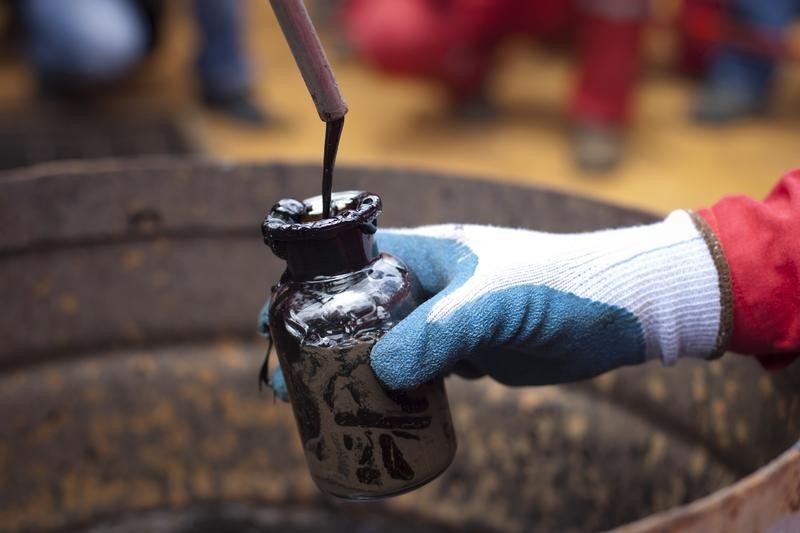By Barani Krishnan
Investing.com - China will pay, says Donald Trump. Oil bulls are paying too.
The U.S. president's latest salvo at Beijing as his administration prepared to carry through on his threat to more than double tariffs on $200 billion of Chinese goods reverberated from Wall Street to the oil market.
West Texas Intermediate futures, the benchmark for U.S. crude, settled down 42 cents, or 0.7%, at $61.70 per barrel.
London Brent futures, the global benchmark for oil, managed to finish the official trading session up 2 cents at $70.39. But it fell back in post-settlement trade, sliding 17 cents to $70.20 by 3:00 PM ET (19:00 GMT).
Both WTI and Brent saw choppy trading through the day as worries about a collapse in U.S.-China trade negotiations faced off with concerns about outages in crude supply across the world.
Trump says China “broke the deal” in trade talks with Washington and would face stiff tariffs if no agreement is reached. He wants to raise tariffs to 25% on $200 billion of Chinese imports, which are now at 10%.
But Trump walked back his rhetoric some this afternoon, saying that a deal with China was still possible this week and that he had received a "beautiful" letter from Chinese Premier Xi Jinping.
China's top trade negotiator, Vice Premier Liu He, was due to visit Washington on Thursday.
China has vowed to hit back at the U.S., saying escalating trade frictions were not in the interest of either country or the world.
For bulls like Phil Flynn of The Price Futures Group brokerage in Chicago, Thursday's market slide on the trade saber-rattling by Trump belied serious supply disruptions and geopolitical tensions associated with oil that should see the market rally instead.
"Another wacky week in oil and it seems to get a bit wackier every day," Flynn said.
He cited Wednesday's data from the U.S. Energy Information Administration reporting a crude stockpile drop of 4 million barrels last week, projectiles fired from North Korea, ongoing fighting in Libya and threats by Iran to shut down two of the world’s most important waterways: the Strait of Hormoz and the Bab el-Mandeb Strait.
"Iran has given Europe an ultimatum to get the U.S. off its back or it will backtrack out of the old nuclear deal and begin enriching uranium," Flynn added. "The EU, overnight, urged Iran to respect the nuclear deal, says it aims to continue trading with Islamic Republic despite U.S. sanctions."
A survey from S&P Global) Platts released on Thursday showed that OPEC’s collective production held relatively steady in April. After four months of declines that tightened the oil market "considerably,” output rose by just 30,000 barrels per day to 30.26 million bpd, Platts said.
The survey found that production levels among members varied, with Saudi Arabia producing at a 15-month low, while Iran’s output fell to levels that were even lower than at previous times when it was under U.S. sanctions.
Despite large increases in output from Iraq and Nigeria, compliance with the output restraint agreement was 116% for the 11 members with quotas.
An oil contamination also forced Russia to halt flows along the Druzhba pipeline, a key conduit for crude into Eastern Europe and Germany, in April. The suspension left refiners scrambling to find supplies, and its duration is unclear. Polish officials expect the pipeline will be operating normally later this month.
"While it is still difficult to assess the final impacts on balances, the severity of the problem could mean up to 400,000 bpd of Russian exports could be pulled out of the market for longer than earlier anticipated," analysts at Citi said.
To analysts with a more neutral bias, it wasn't surprising to see the oil market respond to Wall Street's vagaries rather than the underlying supply-demand, especially when algorithmic trading models and momentum-sensitive hedge funds were leading the action.
"The time-structure of oil markets are still supportive, the geopolitical risks are still very strong," said Olivier Jakob of Zug, Switzerland-based consultancy PetroMatrix. "But for now we can’t escape from the Chinese headlines."
